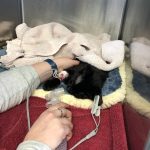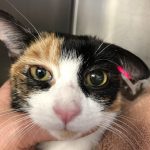Hello,
This is a tough one. The problem really lies in the inability to localize and identify the lesion causing all of the clinical signs. I would look into Horners Syndrome and see a cat specialist. I also would consider a long discussion with a trusted vet on what is treatable and what isn’t based on most likely diagnosis. That’s really what you need. Help from someone who will talk about your case within your budget and comfort zone. I have to add one more thing. It really bugs the heck out of me to have a vet who won’t talk to you further after you discuss and confide in your inability to see a specialist (who will likely want a ct that you also can’t afford). Sorry. Soapbox moment.
Keep me posted on your cats status please.
Had CT done of my cat Lucas due to no resolution of respiratory problems with antibiotics. Here are the results.
Moderate to marked thickening of the roof of the nasopharynx
• Otitis media bilaterally
• Lymphadenopathy left medial retropharyngeal lymph node
The marked thickening of the mucosal lining of the roof of the nasopharynx in conjunction withthe enlarged left medial retropharyngeal lymph node are highly suggestive for neoplastic
, and round cell neoplasia is the top differential diagnosis. Differentials include mast-
cell tumor, squamous cell carcinoma, adenocarcinoma, other. The mucosal thickening of the roof
of the nasopharynx can explain the bilateral otitis media due to mechanical obstruction of the
openings of the auditory tubes into the nasopharynx. A differential to neoplastic infiltration is
marked non-infectious inflammation (e.g. lymphocytic plasmacytic, eosinophilic) or
granulomatous inflammation (e.g. Cryptococcosis) but the later one is considered far less likely
here. The findings are not typical for inflammatory polyps.The bilateral otitis media is explains the history of head tilt and Horner’s syndrome.
Rhinoscopy/retrograde pharyngoscopy is recommended for further evaluation including FNA
sampling and biopsy. FNA sampling of the left medial retropharyngeal lymph node is warranted
as well. The prednisolone treatment may influence results of the samples.
I think all the tests and surgeries that may follow will be out of my budget. Already spent over $1000 to date with no resolution.
Wondering if there are veterinarians who would go in and remove the polyp – appears to be a poly under soft palate – just to give the cat some relief and time.
Opinions and suggestions are welcome.
Comments
My cat was taken in to the vet in May to treat allergies, difficulty breathing (snoring sounds) and a head tilt. Was given an anti inflammatory, antibiotic (convenia), vitamin b-12, ear drops, and an X-ray. Diagnosed with asthma brought on by allergies. Lungs ok. Three weeks later breathing and itching had improved, but third eyelid started showing.
Vet would not see him and said to go to a specialist.
Took the cat for a second opinion. That vet said we should check for nasal polyps. Was sedated and had an exam of ears and throat. No polyps were visible. Vet felt a small enlarged area under the soft palate, but could not confirm this was a polyp. Head tilting stopped after first visit. Recurred a few days ago. Not present now. Second vet recommended going to a specialist for ct scan. It is cost prohibitive and I’m not sure it is necessary. Third opinion from an online site recommended we try antibiotics for the respiratory issues. Started on one antibiotic today for ten days. And started on purina fortiflora.
Looking for any other advice or experience with issues like this. I’ve never had a cat with these problems.
Thanks.
#cats #nasal #headtilt #respiratory #polyps
Comments
My rescue cat of 5 years is showing all the symptoms of Nasopharyngeal Polyp. He is my everything!
OH please I am begging for help here ! I am disabled and he is the center of world . I am on the south west coast of Washington State, my rescue cat Kiki presents with all these symptoms ( I come from a family of RN and Bachelor in Nursing ) I have called vest around here and ALL of them say they do not do this surgery because they dont have the scope, or they will not even discuss possible price or treatment without me coming in and the vet seeing them. They say they will diagnose and refer me to a specialty clinic not far away . The specialty clinic gave me a quote of $3,500-$5,000 !! If this is even what is wrong with him . I am devastated that no one will even discuss this with me without paying for a vet visit. It looks like i could spend hundreds in visits before i can find someone who is even willing to think about this surgery without referral to the very expensive specialty place . PLEASE HELP I CANNOT AFFORD THAT MUCH !! Meanwhile my poor sweet Kiki is slowly getting worse. I dont know what to do anymore !!!!!!!!
Comments
I have a senior cat who goes into labored open mouth breathing when he is in a hard purr and also has wheezing and snoring but otherwise acts normal – eats, drinks, and is active for his age. The snoring is even when he’s not in a deep slumber and it can be an airy rattle if that makes sense and he has a little squeak when he swallows. I saw your video on the cat with a polyp and thought maybe this could be what he has except that he’s almost 17 so the vet suggested it probably isn’t since that’s more of a young cat thing but did suggest a scope and CT which will cost me 2500-3500 and he will have to be put under. In reading about breathing, heart disease can also cause breathing problems and since he has heart disease I would hate to spend all the money and put him through that to be told the scope didn’t show anything. I’ve also been reading about asthma, but my regular vet nor the specialist even mentioned that it could be that and from what I’ve read, it’s hard to diagnose. He’s a flame point Siamese and he has early ckd and some heart disease (stage 3/4 systolic murmur and hypertension), so I’m nervous about putting him under. Aside from these “old man” things, the specialist and my regular vet say his labs are spectacular. The specialist said when she is presented with a cat that has these conditions, they bloodwork and labs never look this good. So I certainly don’t want to put him down if he looks good but I also feel like he can’t be comfortable with these breathing episodes. One thing to note, when they did bloodwork a couple of weeks ago, his eosinophils were elevated which I have read can be linked to upper respiratory and asthma. Im putting the link to videos of the wheezing and purring to see if you’ve ever seen such a thing in a cat. I sure wish I had you closer by. Thank you so much!
Jill
Wheezing https://youtu.be/gaf7WCRzu80
Purr/breathing https://youtu.be/kqnd4YORenY
Comments
Comments
Comments
-
Gary Stokes Good thing it was a polyp! My cat was doing the same thing and no polyp was found.
This went on for about 4 years and her vet kept giving her different antibiotics and nothing helped. I asked if they could do a nose culture.
And they said no they couldn’t so like I said it went on for 4 years!! It wasn’t until moved back to Lexington SC from Nashville TN that her doctor in Columbia SC saw her. And I told her what was going on and what they said about they couldn’t do a culture! And she said sure they could have! And she said I’ll do one now!
And she sent it off to be tested and it came back that she had pseudmonas!! It is resistant to most all antibiotics! That’s why nothing they had given her helped! But the good news is there was one antibiotic that it wasn’t resistant to it was marblefloxin ” zinaqun ” she but her on a two month round of doses and it cleared it right Up!! -
Gary Stokes Be very careful pseudmonas outbreaks in cats are running rampant in the United States in the last several years so if your car shows any signs of nasal discharge and whising and sneezing get him or her checked for a polyp! If no polyps them get them checked for pseudmonas! Pseudmonas is very Dangerous!! It can cause nerve damage! Nurolagical problems heat problems peralisis and even Death!!
Hi dear my 2 months old canaries have Colon polyps and they are not looking well they do eat and fly but not helthy and active please help me .
What medication will help please?

















Good morning- I’m sorry you’ve been through so much already, and still are having issues. Did you speak candidly with your primary vet already about all of these findings and your wishes? (Meaning the removal of the polyp or at least some relief) That is probably where I would start. I would also make a few phone calls… local rescue organizations that may be willing to help fund your surgery. Or possibly your vet may let you pay a little at a time as you have already paid so much? I hope things get better soon!????????
I agree with Sarah! Ask around to find someone locally to give you affordable options.